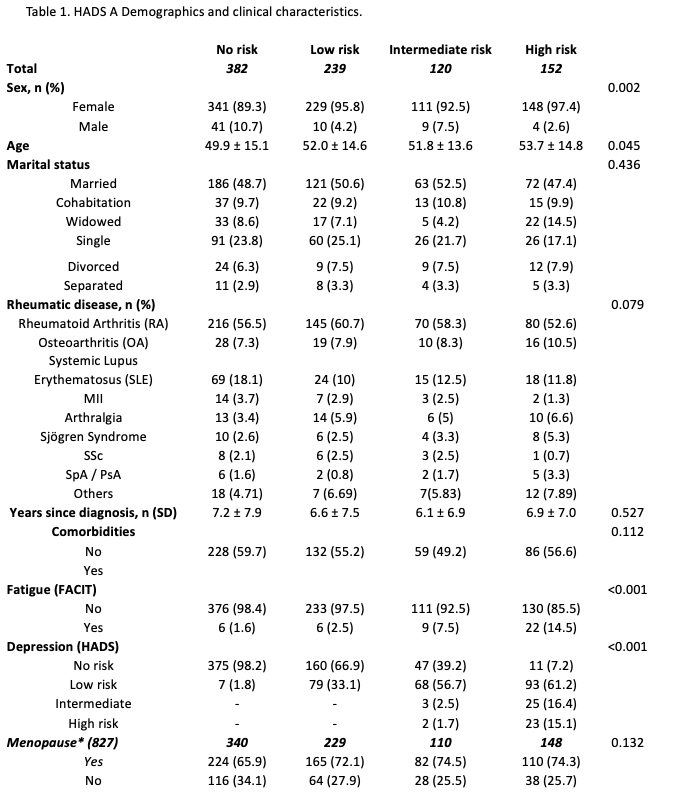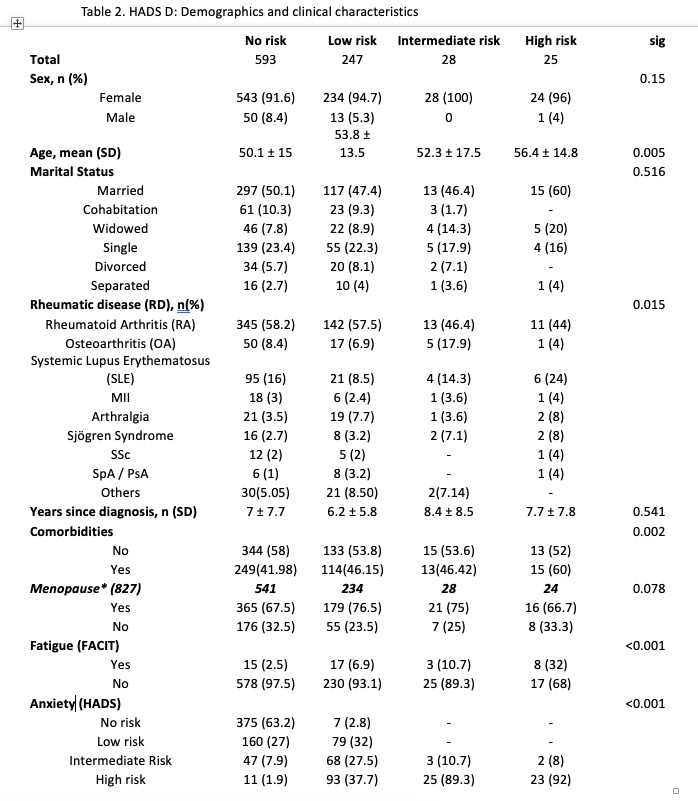Session Information
Date: Monday, November 13, 2023
Title: (1256–1263) Psychology/Social Science – Interprofessional Poster
Session Type: Poster Session B
Session Time: 9:00AM-11:00AM
Background/Purpose: Depression is one of the most common psychiatric comorbidities in patients with rheumatic diseases. A study has shown that almost a third of patients with Rheumatoid Arthritis (RA) present symptoms of major depressive disorder, making it more prevalent than general population. (1) Early and continuous screening could help reduce the prevalence of mental health disorders. (2) The objective of this study was to evaluate and identify patients at risk of developing anxiety and/or depressive disorders.
Methods: We conducted a cross-sectional study at the outpatient rheumatology clinic of Hospital Universitario Dr. José Eleuterio González. Patients aged 18 and older with at least one rheumatic disease were included. Sociodemographic and disease activity data were collected from records. We administered the Hospital Anxiety and Depression Scale (HADS): a score of 0 is classified as no risk, 1-7 points low risk, 8-10 intermediate risk, and >11 high risk. For fatigue, we utilized The Functional Assessment of Chronic Illness Therapy scale (FACIT). Those identified as high risk were referred for psychiatric evaluation.
Results: We enrolled a total of 893 patients. Based on their scores, 42.70% (382) showed no risk of anxiety, while 57.22% (511) had a low, intermediate, or high risk (Table 1). Among the patients without anxiety symptoms, 89.3% (341) were female, with a mean disease duration of 7.2 +/- 7.9 years and a mean age of 49.9 +/- 15.1 years. Rheumatoid Arthritis (RA) was the most common diagnosis, accounting for 48.7% (186). On the other hand, only 152 patients (16.57%) were classified as high risk for anxiety, with 97.4% of them being female. The mean age in this group was 53.7 +/- 14.8 years, and mean disease duration was 6.9 +/- 7 years. Among those at high risk, RA was the most prevalent diagnosis, affecting 52.25% (80) of the patients (Table 1). Regarding risk of depression, 66.40% (593) of all patients presented no risk of depression, while 33.57% (300) had a low, intermediate, or high risk. Among those without depression symptoms, 91.6% were female, with a mean age of 50.1 +/- 15 years. RA was the most frequent diagnosis, accounting for 58.2% of the patients. In the group with a high risk of depression, we found 2.79% (25) of patients, with a mean age of 56.4 +/- 18 years and a mean disease duration of 7.7 +/- 7.8 years (Table 2). Fatigue and depression risk were more prevalent in individuals with higher anxiety scores (p < 0.001)
Conclusion: Our findings revealed that in our patient population, risk for anxiety and depression increases with age, and is more prevalent in women. Additionally, we observed that fatigue was associated with both anxiety and depression risk scores. Furthermore, there was a positive association between high-risk scores for anxiety and high-risk scores for depression. Based on these results, we strongly recommend the regular screening of patients who are at high risk of developing mental health problems
To cite this abstract in AMA style:
Vega Sevilla L, Villarreal-Alarcon M, Flores-Gutierrez D, Corral-Trujillo M, Juarez R, Hernandez Galarza I, Cardenas-De la Garza J, Galarza-Delgado D. Depression and Anxiety Risk Assessment in Patients with Rheumatic Diseases [abstract]. Arthritis Rheumatol. 2023; 75 (suppl 9). https://acrabstracts.org/abstract/depression-and-anxiety-risk-assessment-in-patients-with-rheumatic-diseases/. Accessed .« Back to ACR Convergence 2023
ACR Meeting Abstracts - https://acrabstracts.org/abstract/depression-and-anxiety-risk-assessment-in-patients-with-rheumatic-diseases/


